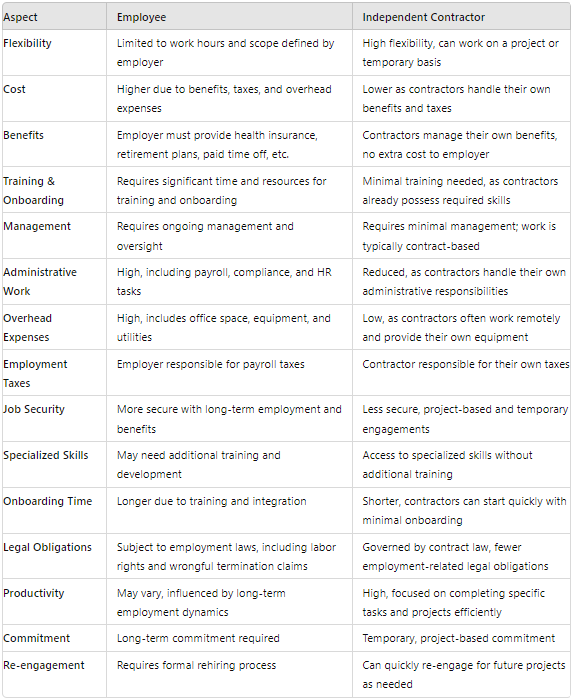Is An Independent Contractor Best For Your Business
In the past, managing a business’s administrative tasks typically involved hiring full-time staff. This approach often meant long-term commitments, significant overhead costs, and extensive onboarding processes. However, the rise of the gig economy and the availability of virtual administrative assistants as independent contractors have revolutionized this aspect of business operations. Today, businesses can leverage the benefits of hiring independent contractors, offering greater flexibility and cost savings.
The debate over whether to hire an employee or an independent contractor has been ongoing, with no definitive answer. Both options have their own set of advantages and disadvantages, making it essential for businesses to understand these differences before making a decision. In this blog, we will delve into the numerous advantages of hiring independent contractors for your business’s administrative needs, helping you determine if this approach aligns with your organizational goals. By focusing on key factors such as cost, flexibility, and customer experience, we aim to provide a comprehensive guide to assist you in making the best choice for your business.
Additionally, we’ll explore how each hiring option affects the 3 R’s of business: customer retention, referrals, and revenue. Understanding these impacts will help you optimize your hiring strategy to enhance your overall business performance and customer satisfaction.
“Everything starts with the customer.”
– Louis XIV
Impact on customer retention
When considering the 3 R’s of business—customer retention, referrals, and revenue—hiring decisions play a crucial role. Employees often develop long-term relationships with customers, providing consistent service and building trust over time. This continuity can significantly enhance customer retention, as clients appreciate the familiarity and reliability of interacting with the same individuals. Employees who are well-trained in company policies and customer service standards are better equipped to handle client concerns and foster loyalty.
On the other hand, independent contractors can also contribute positively to customer retention, especially when they bring specialized skills and a high level of expertise. By offering efficient and effective solutions to customer problems, contractors can improve customer satisfaction and retention. However, the temporary nature of contract work might pose a challenge, as customers might prefer dealing with familiar faces and consistent service providers.
influence on referrals
The ability to generate referrals is another critical aspect influenced by hiring choices. Employees who have a deep understanding of the company culture and values can act as strong brand ambassadors. Their ongoing interactions with customers provide opportunities to cultivate positive experiences, which can lead to word-of-mouth referrals. Happy and satisfied customers are more likely to recommend your business to others, thus enhancing your referral rate.
Independent contractors, with their specialized knowledge and skills, can also drive referrals, particularly if they excel in delivering exceptional results on specific projects. Their unique expertise can leave a lasting impression on clients, prompting them to recommend your services to others. However, because contractors may not be as deeply integrated into the company culture as full-time employees, there might be a limit to how effectively they can promote the business beyond their project scope.
Effect on revenue
Revenue generation is perhaps the most direct indicator of a business’s success, and hiring decisions can have a substantial impact. Full-time employees, through their consistent performance and long-term engagement, can contribute to steady revenue streams. Their loyalty and familiarity with the business processes enable them to work efficiently, leading to higher productivity and, consequently, increased revenue.
Independent contractors, due to their flexibility and specialized skills, can also boost revenue by enabling businesses to take on diverse projects without the long-term financial commitment of hiring additional full-time staff. Contractors can be engaged on an as-needed basis, allowing businesses to manage costs more effectively while maximizing project outcomes. The cost savings from not having to provide benefits and the ability to adjust staffing levels based on demand can positively impact the bottom line.
Understanding how hiring employees versus independent contractors affects the 3 R’s of business—customer retention, referrals, and revenue—is essential for optimizing your hiring strategy. Employees offer stability, brand consistency, and long-term customer relationships, while contractors provide flexibility, specialized skills, and cost-effective project management. By carefully considering these impacts, you can tailor your hiring approach to enhance overall business performance and customer satisfaction. Whether you opt for the reliability of employees or the expertise of contractors, aligning your hiring strategy with your business goals will ultimately drive success.

1. increased flexibility
One of the most significant benefits of hiring independent contractors is the increased flexibility it offers. Businesses can engage contractors for specific projects or periods without committing to a long-term employment relationship. This flexibility allows companies to scale their workforce up or down based on their current needs, ensuring they only pay for the services they require. This is particularly beneficial for businesses experiencing fluctuating workloads or those needing specialized skills for short-term projects.
2. access to in-demand skills
Independent contractors often possess specialized skills and expertise that may not be readily available within your current team. Many professionals transition to independent contracting to focus on niche areas where they excel. By hiring these contractors, businesses gain access to high-level skills and knowledge that can significantly enhance their operations. Whether you need assistance with complex data analysis, digital marketing strategies, or administrative support, there’s likely an independent contractor with the precise skills you need.
3. competitive advantage
Hiring independent contractors can provide a competitive edge in the marketplace. Their ability to offer flexible staffing solutions and specialized skills allows businesses to respond quickly to changing market demands. Independent contractors can be brought on board to meet project deadlines, implement new strategies, or manage peak periods, ensuring your business remains agile and competitive. Additionally, the cost savings associated with hiring contractors can be reinvested into other areas of the business, further enhancing your competitive position.
4. cost savings
One of the most compelling reasons to hire independent contractors is the potential for significant cost savings. Unlike traditional employees, independent contractors are responsible for their own benefits, taxes, and other expenses. This means businesses can avoid costs associated with employee benefits such as health insurance, retirement plans, and paid time off. Additionally, contractors often work remotely, reducing the need for office space and related overhead costs. These savings can be substantial, particularly for small and medium-sized businesses operating on tight budgets.
5. reduced onboarding time
The process of hiring and onboarding employees can be time-consuming and resource-intensive. Independent contractors, on the other hand, often require minimal onboarding. Many contractors are experienced professionals who can quickly integrate into your team and begin contributing to your projects. This streamlined onboarding process allows businesses to save time and resources, enabling them to focus on core activities and strategic initiatives.
6. corporate agility
In today’s fast-paced business environment, agility is crucial. Independent contractors enable businesses to adapt quickly to changes in the market, access new resources, and manage costs more effectively. By engaging contractors for specific projects or tasks, businesses can respond to new opportunities and challenges with greater speed and flexibility. This agility can be a key factor in maintaining a competitive edge and achieving long-term success.
7. re-engage top talent
One of the advantages of working with independent contractors is the ability to re-engage top talent for future projects. Many businesses develop strong relationships with contractors who consistently deliver high-quality work. By maintaining a network of trusted contractors, businesses can quickly re-engage these professionals when new projects arise, ensuring continuity and leveraging their expertise for ongoing success.
8. increased efficiency
Independent contractors are often highly focused on delivering results. Their primary goal is to complete assigned tasks efficiently and effectively, which can lead to increased productivity for your business. Without the distractions of office politics or long-term employment concerns, contractors can concentrate on their work and achieve outcomes more swiftly than traditional employees.
9. minimal overhead expenses
Engaging independent contractors can significantly reduce overhead expenses associated with hiring, engaging, and managing employees. Contractors typically work remotely, eliminating the need for additional office space, equipment, and utilities. Additionally, businesses can avoid costs related to employee benefits, payroll taxes, and other administrative expenses, resulting in substantial savings.
10. no employment benefits
One of the financial advantages of hiring independent contractors is the absence of employment benefits. Contractors do not require health insurance, retirement plans, paid time off, or other benefits typically provided to employees. This can lead to considerable cost savings, particularly for small businesses with limited resources.
11. project-based staffing
Independent contractors are ideal for project-based staffing needs. They can be engaged for specific projects with clearly defined goals and timelines, allowing businesses to address immediate needs without long-term commitments. This approach ensures that resources are allocated efficiently and that projects are completed on time and within budget.
12. minimal management required
Independent contractors generally require less oversight than traditional employees. Their contracts typically outline specific deliverables and deadlines, reducing the need for constant supervision. This allows business owners and managers to focus on strategic initiatives and core business activities, rather than day-to-day management of staff.
13. reduced administrative work
Outsourcing administrative tasks to independent contractors can streamline processes such as background checks, contract reviews, and compliance tasks. This reduction in administrative work frees up internal resources and allows businesses to concentrate on their primary objectives. Additionally, many contractors are experienced in managing their own administrative responsibilities, further reducing the burden on your organization.
14. no required training
Independent contractors are often hired for their expertise and specialized skills, eliminating the need for extensive training. This can significantly shorten the time required for onboarding and expedite the start of projects. Contractors can hit the ground running, bringing their knowledge and experience to bear on your business challenges from day one.
Need more reasons? Alexander Holburn, a Canadian law firm that provides a wide range of services including business law services, confirms the above and more in their article: The Differences Between Independent Contractors And Employees
When it comes to meeting your company’s administrative needs, you have a variety of options, including hiring full-time employees. However, the flexibility, cost savings, and access to specialized skills offered by independent contractors make them an attractive alternative. By carefully considering the advantages outlined in this blog, you can determine if hiring an independent contractor is the right choice for your business.
If you’re unsure whether an independent contractor will work best for your needs, contact us at Boost Customer Retention. We’ll help you find the right solution to enhance your business operations and achieve your goals.
Author Bio:
Boost Customer Retention is dedicated to helping businesses enhance their customer retention strategies. With our expertise in customer retention, referrals, and revenue growth, we provide tailored solutions to meet your unique needs. Contact us today to learn how we can support your business in achieving long-term success.







